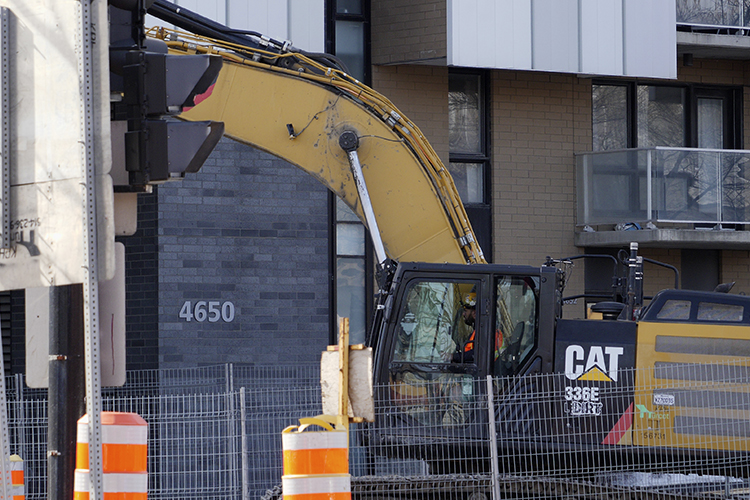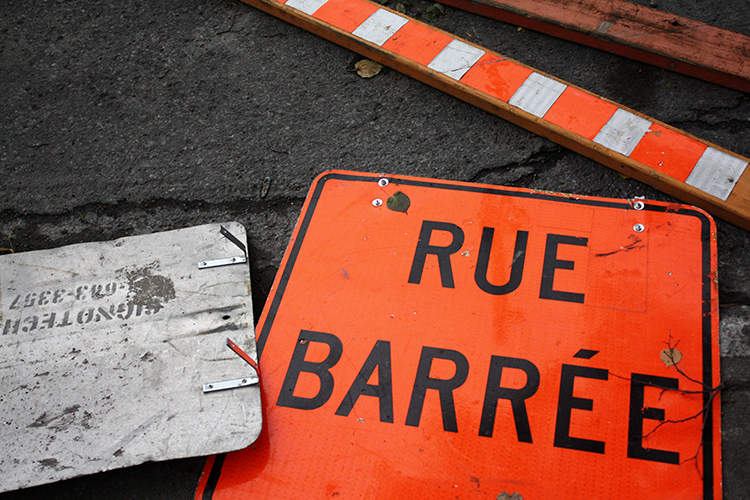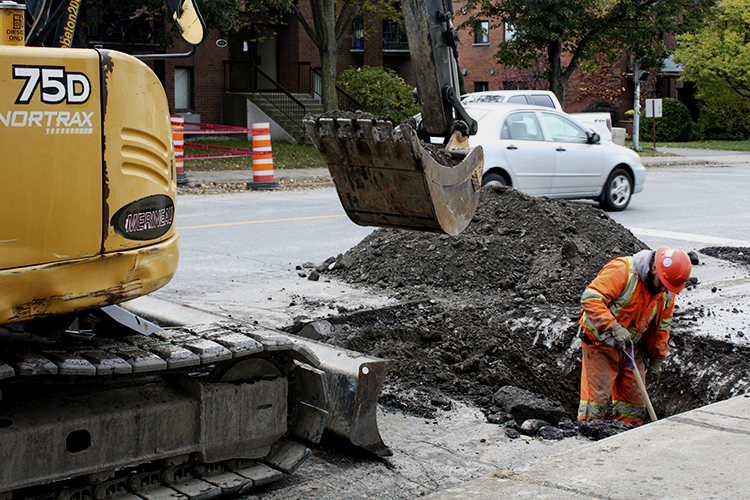BY Adam Honigman & Ireland Compton
Matias Rittatore travels almost daily from his home near Décarie to his job as a video game tester in downtown Montreal. What should be a relatively quick drive has been hampered by long delays and frequent detours.
“There’s a frustrating amount of construction in the city,” says Rittatore. “But that has always been the case.”

Many drivers find themselves stuck in traffic or forced to detour because of constant construction. Photo by Ireland Compton.
In the summer of 2019, Montreal planned 25 major road projects covering about 260 km of road. Calgary had 20 road infrastructure plans plus some additional paving projects. Vancouver had seven of their major roads under construction for a total of 30 km. Toronto planned an overhaul of the entire city, putting over $1 billion into infrastructure and paving projects.
“Delays are a result of poor planning and unrealistic expectations,” according to Osama Moselhi, a professor and construction researcher at Concordia University. “They can happen in every major province and city.”
A comparison of summer construction projects between Montreal and Vancouver. Media by Adam Honigman.
Construction companies submit bids in order to win contracts. According to Moselhi, this encourages companies to offer the most optimistic timelines even if they may not be completely possible.
Ethan Cox, an editor for Ricochet Media and an urban planning expert, feels that governments do a poor job at holding companies accountable for these lofty promises.
“We don’t really have a good mechanism to address the problem [of extended deadlines],” he says.
For example, the construction of the new Champlain Bridge were originally projected to be completed in 2018, but it was not officially inaugurated until the summer of 2019. It’s a problem that often frustrates commuters and those living near the construction zones.
Projects sitting idle outside a St-Henri apartment complex cause frustration for building residents. Video by Ireland Compton.
Another reason for the apparent constant state of construction in Montreal is a heavy backlog of projects dating back through multiple administrations.
Cox says that leaders have “kicked the can down the curb” in order to not have to face the inconvenience and costs of large infrastructure projects. This has led to a surplus of repairs across the whole city as opposed to the creation of new projects.
Roger Friolet from the FTQ-Construction workers union says that a major part of the delays in awarding contracts was ex-Premier Pauline Marois’ 2013 requirement that all companies be approved by the AMF securities commission before being allowed to bid. It came after the Charbonneau Commission found corruption to be “far more widespread than originally believed.”
Corruption is Cox’s final reason for why Montreal may seem uniquely plagued with construction problems. Lower quality building materials and deliberately unreasonable budgets and timelines result in constant delays and even more construction.

Many drivers find themselves stuck in traffic or forced to detour because of constant construction. Photo by Cristina Sanza.
The MBNCanada Performance Measurement Report for 2017 revealed that Montreal spent $27,577 per kilometre stretch of a single lane paved road compared to the $11,926 average in other cities.. However, Cox also acknowledges that criminal corruption could very well be a major factor in other cities as well, but simply hasn’t been uncovered.
One thing that all the experts we spoke to agree about is that the problems begin at the top.
“[Construction workers] do the work when the work occurs but don’t decide when it occurs,” says Friolet. He says workers are not sent home if a project is stalling, but instead are moved around to work on different jobs where they are needed. The workers themselves are no fan of the amount of traffic issues that stem from roadwork in the city.
“When you’ve been working eight to ten hours and then need to spend another two in traffic,” says Friolet, “it makes for a very long day.”
He adds that most project delays do not come out of the blue and it’s rare for delays to crop up that weren’t already obvious in advance.

Construction workers in Montreal are often moved to another job when a project is on hold. Photo by Cristina Sanza.
As to how to save many of the planning issues ahead of time, Moselhi believes partnerships with universities could be the ideal solution.
“We have models that can help estimate how long and how costly a project should reasonably be,” says Moselhi.
Even if a solution is found for future projects, Cox says Montrealers would still be in for a “decade of pain” simply because of all the construction backlog that still needs to be completed.




